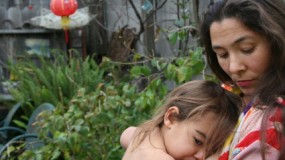May 29, 2019 – The New Jersey Department of Health (NJ DOH) has awarded the Central Jersey Family Health Consortium (CJFHC) $114,000 to partner with the New Jersey Breastfeeding Coalition (NJBC) to develop a statewide Breastfeeding Strategic Plan for New Jersey.
The plan will serve as a blueprint to coordinate government efforts and mobilize diverse stakeholders and to prioritize actions to improve the state’s breastfeeding rates. Priorities include increasing breastfeeding initiation and duration and increasing statewide lactation support.
“The benefits to breastfeeding are endless, and I am thrilled that the CJFHC and NJBC’s Statewide Breastfeeding Strategic Plan will work with key stakeholders, community organizations, businesses, and healthcare providers to increase awareness and support,” said First Lady Tammy Murphy. “By developing supports for women of color who experience barriers to breastfeeding, this plan will continue to build on the Nurture NJ campaign efforts to ensure equitable maternal and infant care to all women and children.”
While the American Academy of Pediatrics recommends exclusive breastfeeding for the first six months followed by continued breastfeeding along with the introduction of solid foods through the end of their first year and beyond, just 35.2% of New Jersey infants were exclusively breastfed at hospital discharge in 2016 and that rate decreased to 32.8% in 2017 (NJDOH). Exclusive breastfeeding rates in NJ drop significantly after hospital discharge with only 24.4% of infants being exclusively breastfed at six months in 2015 (U.S. Centers for Disease Control).
“The Department of Health is proud to partner on the development of a statewide breastfeeding strategic plan with the Department of Human Services and many other maternal and child health partners,” Health Commissioner Dr. Shereef Elnahal said. “Initiating and continuing breastfeeding is an important component of infant health and plays a strong role in reducing black infant mortality.”
The Department of Health leads many breastfeeding programs through its Women, Infants and Children program (WIC) and its $4.3 million Healthy Women, Healthy Families initiative, but a statewide strategic breastfeeding plan would enhance these programs, leverage partnerships and establish goals for the state to achieve over the next five to 10 years, Commissioner Elnahal added.
The statewide Breastfeeding Strategic Plan will focus on alleviating barriers to breastfeeding among families of color and other underserved populations, including WIC and SNAP participants. The incidence of any amount of breastfeeding at hospital discharge among black infants in the state is historically lower than for other racial/ethnic groups. For example, in 2016, only 66.8% of black infants were breastfeeding (exclusive and in combination with formula) at hospital discharge as compared to 75.5% of white infants. Asian and Hispanic infants were breastfed at higher rates, 82.9% and 80.7% respectively.
The grant was provided through the SNAP-Ed program, which is the nutrition education component of Supplemental Nutrition Assistance Program (SNAP). The SNAP-ED program in New Jersey is a joint collaboration between the Department of Human Services and the Department of Health.
“Being able to fund this breastfeeding planning grant through SNAP-Ed is one more way we can support our goal of improving nutrition and health among New Jersey’s families,” said Human Services Commissioner Carole Johnson. “The benefits of breastfeeding are well known, so encouraging and supporting breastfeeding is always a positive step for New Jersey’s health and wellbeing.”
The statewide Breastfeeding Strategic Plan project will include two stages. Initially, participants will identify breastfeeding opportunities and barriers in the state, evaluate current data, trends and disparities in breastfeeding rates, and assess the specific needs of WIC and SNAP participants. Key stakeholders from both traditional and non-traditional partners in government, community organizations, healthcare, business, insurance, education and families will be engaged to obtain their feedback on factors that influence breastfeeding success among New Jersey families, especially among those who experience the greatest barriers.
“National studies support that breastfeeding is important not only in the short term, but also because it improves health outcomes for both the infant and mother well beyond the perinatal period. For example, one of the most exciting recent findings is that breastfeeding for at least six months cuts in half the mother’s risk of diabetes throughout the childbearing years.* This is especially important for Hispanic and black women who have a higher incidence of this disease,” said Robyn D’Oria, CEO CJFHC.
During the second phase, current policies and practices will be reviewed and opportunities for multi-sector collaboration will be explored. High-leverage systemic and environmental changes will then be proposed to improve lactation education and support in healthcare settings, workplaces, and the community. All data, goals and proposed actions will be compiled into the final Breastfeeding Strategic Plan to be presented to the NJDOH for review and implementation.
“We are grateful for the Department of Health’s support for prioritizing breastfeeding as a public health imperative,” said Ellen Maughan, Project Manager and NJBC Trustee. “This statewide strategic plan will engage and challenge government, healthcare providers, community members and business to partner in novel and creative ways to normalize breastfeeding in New Jersey.”
About CJFHC:
Central Jersey Family Health Consortium (CJFHC) is a private non-profit 501c(3) with experience collaborating with community-based organization, health care providers, governmental organizations and consumers to assess maternal and child health needs and to provide services and programs which improve the health of women of childbearing age, infants and children throughout Central Jersey.
About the NJBC:
The New Jersey Breastfeeding Coalition (NJBC) is a non-profit organization whose mission is to protect, promote and support breastfeeding by working collaboratively. The vision of the NJBC is to normalize breastfeeding, to support an inclusive breastfeeding environment, to promote evidence-based and culturally sensitive breastfeeding education, information and support, and to ensure that everyone who breastfeeds or provides human milk has the resources to meet their goal.
- https://www.sciencedaily.com/releases/2018/01/180117185037.htm

